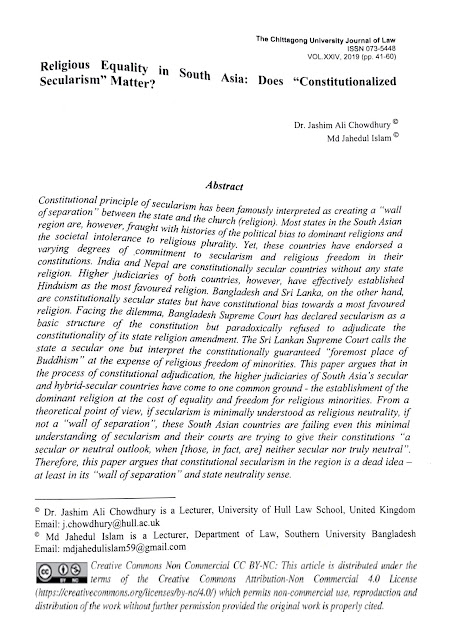Sunday, August 6, 2023
Thursday, August 3, 2023
Wednesday, August 2, 2023
Parliament of Bangladesh: Constitutional Position and Contributions
The Parliament (Jatya Sangsad) of Bangladesh
M Jashim Ali Chowdhury
Published in: Po Jen Yap and Rehan Abeyratne (eds) Routledge Handbook of Asian Parliaments, (Routledge 2023), pp 103-124
Link: https://doi.org/10.4324/9781003109402-9
Abstract
The Parliament of Bangladesh (hereinafter, the Parliament) is officially known as the Jatiya Sangsad (House of the Nation). It is a unicameral legislature established under Article 65 of the Constitution of the People's Republic of Bangladesh (hereinafter, the Constitution). Modelled on Westminster, the Parliament is entrusted with legislative powers, constitutional amendment power, financial and budgetary powers, and the powers of democratic oversight over the government. The Prime Minister and the Cabinet are drawn from the majority parliamentary party. The government remains in power so long as it bears the confidence of Parliament. As Bangladesh recognises constitutional supremacy, parliamentary laws and even constitutional amendments are subject to judicial review. The Supreme Court of Bangladesh is considered the guardian of the written Constitution and, hence, has the power of judicial review over executive and legislative actions. This chapter explains the structure, composition, powers, functions, and legislative process of the Parliament. The chapter also includes critical reflections on several of its institutional aspects.
অতিরিক্ত বিচারপতিদের স্থায়ীকরণ প্রসঙ্গে মহামান্য আপিল বিভাগের সাম্প্রতিক রায়: একটি প্রাথমিক মূল্যায়ন ল'ইয়ার্স ক্লাব বাংলাদেশ সাক্ষাৎকার ...

-
বাংলাদেশের নির্বাচন সংকট ও সমাধান চিন্তা ড এম জসিম আলী চৌধুরী প্রভাষক , আইন বিভাগ , ইউনিভার্সিটি অব হল , যুক্তরাজ্য ...
-
'তত্ত্বাবধায়ক সরকার' ব্যবস্থা: একটি সাংবিধানিক মূল্যায়ন ও বিকল্প সন্ধান (The Caretaker Government: A Constitutional Evaluation and S...
-
সমসাময়িক জুকারবার্গের ফেসবুক, প্লেটোর রিপাবলিক ও সাক্ষ্য আইনের সহজ পাঠ মোহাম্মদ মাহাবুবুর রহমান daily suprobhat bangladesh 27 august ...
.jpg)
.jpg)
_page-0001.jpg)


.png)
.png)

.png)

.png)

.jpg)
